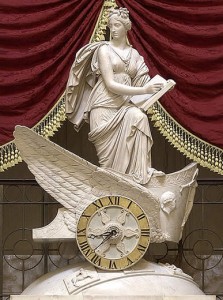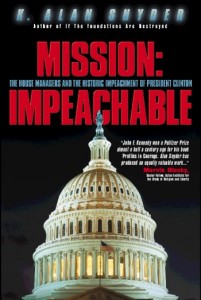Caught between two worlds, yet both informed by my Christian faith. What am I talking about?
 I am a history professor, what you would have to call a “professional historian.” That is one of my worlds. As an academic, I am devoted to research and accuracy in my teaching and writing. Historians generally don’t get involved in commentary on current events, and at least make some attempt at appearing “above politics.” Now, of course, much of that is pretense. For many years, I haven’t joined any of the professional historical organizations; they are sold out to the progressive political correctness that dominates the field. Yet I want to stay in touch with what other historians are writing, so I recently rejoined one such organization, just to see if there is any value in it. Next year, I can make a decision whether to remain a member or not.
I am a history professor, what you would have to call a “professional historian.” That is one of my worlds. As an academic, I am devoted to research and accuracy in my teaching and writing. Historians generally don’t get involved in commentary on current events, and at least make some attempt at appearing “above politics.” Now, of course, much of that is pretense. For many years, I haven’t joined any of the professional historical organizations; they are sold out to the progressive political correctness that dominates the field. Yet I want to stay in touch with what other historians are writing, so I recently rejoined one such organization, just to see if there is any value in it. Next year, I can make a decision whether to remain a member or not.
Another thing about historians/university professors: they rarely allow whatever religious beliefs they have to intrude upon their teaching or writing. Again, there is a lot of pretense there. One’s worldview, which is religious, whether one admits it or not, will always provide the context for one’s reasoning. Those who say they are teaching or writing “value-free” are just as committed to a value as anyone else. It’s just that the value they are communicating is that one should have no values. That, in itself, is a worldview being transmitted to students and readers.
My other world is as a commentator on life. Just look at the title of this blog and you will see where my heart is. My goal is to try to bring my Christian faith to bear on how we perceive the culture, politics, and government of our day. I don’t hold back on what I believe because I have this urgency in my spirit to help others comprehend the Biblical principles that should govern our lives. I focus quite a bit on trying to reach a general audience, not merely a guild of historians who read each other and never touch a wider readership.
There is no separation for me; both worlds coincide. Some, though, would consider my academic world to be tainted. The dominant thinking is that you allow students to roam free without boundaries. I disagree. There is a Biblical framework within which all reasoning should take place. Without that, we go astray from the One who is Truth.
Some in my profession won’t look upon me as a serious academic. After all, I’ve never been published by Harvard, Yale, or any of the other university presses they consider prestigious. One of my books is how to apply Biblical principles to politics; how, they wonder, can that be academic? But I’m not the only one frowned upon. Even a generally lauded writer like David McCullough, who has written masterful works on American history [1776; John Adams] is treated as somewhat less than genuine. You see, he’s not of our particular profession and, horror of horrors, the peasants out there actually read what he writes. That’s beneath our profession’s dignity, don’t you know?
God has given me the task of reaching out to anyone and everyone. I want to do so with a level of maturity and accuracy that transcends simply reactionary political blogging. I want my students and readers to grapple with the deeper issues—the principles that undergird all of life. My goal is to be a solid academic while simultaneously connecting with those who would feel uncomfortable in academic circles.
 In another of my books, the one on the Clinton impeachment, I conducted interviews with all thirteen of the House Managers who argued before the Senate for Clinton’s removal from office. My research was genuine and everything fully documented. Yet I wrote for a general audience. The two worlds should not be divorced. Neither can I omit my Christian faith from anything I write, whether strictly academic or not. Here’s how I explained it in the preface to the impeachment book:
In another of my books, the one on the Clinton impeachment, I conducted interviews with all thirteen of the House Managers who argued before the Senate for Clinton’s removal from office. My research was genuine and everything fully documented. Yet I wrote for a general audience. The two worlds should not be divorced. Neither can I omit my Christian faith from anything I write, whether strictly academic or not. Here’s how I explained it in the preface to the impeachment book:
My presuppositions are first and foremost biblical in orientation. The grid through which I see the world—my basic worldview—is grounded upon biblical principles. These principles form the basis for my values, my decisions, and my analysis of right and wrong. These principles also inform my understanding of the role of civil government, placing me on the conservative side of the political spectrum. Naturally, then, I am predisposed to “take the side,” so to speak, of the House Managers.
But I am also an academic. The training I receive in academia requires that I follow the evidence wherever it may lead. I must be honest and cannot, in good conscience, misrepresent the facts. Properly understood, there is no dichotomy here. My Christianity and my academic training require the same standard. Academic integrity rests upon moral integrity, which I believe flows from biblical faith. Consequently, when I undertake any research and writing project, I must be true to that faith. Political conservatism must become secondary; the truth must have priority.
That is my personal creed as a Christian and a historian. I can be both without contradiction. I am not a historian who just happens to be a Christian; I am a Christian who fulfills his ministry through my role as a historian. There is a difference.
